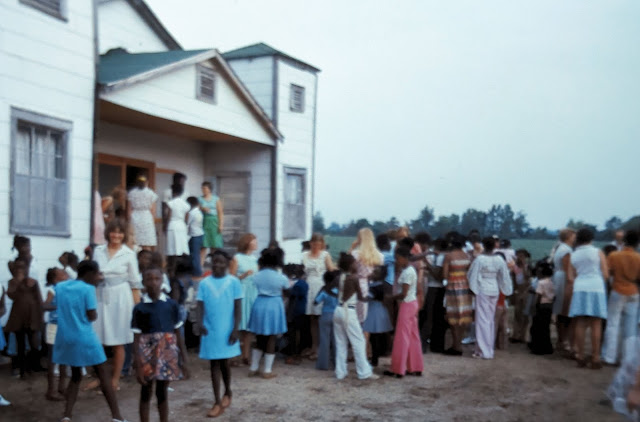What do I remember? The place was close enough to Vicksburg for us to visit the battlefield, which was primarily a siege of that Mississippi citadel Grant wanted--which is to say, needed--to take to control Mississippi river traffic. And did. I'd never been that close to "the War of Northern Aggression."
But mostly what I remember was that it was a "service trip," service, as in "Christian service." We were a couple of dozen earnest members large, most of the crew high school-age girls recruited to staff children's bible schools in area churches, churches that stood out in the country, in the cotton fields where the kids' parents worked.
The quality of these old pictures isn't good, but then they're all just about fifty years old. It was 1977, and my wife and I were also recruited to come along and help--doing exactly what, back then, wasn't always clear. Two weeks, as I remember, enough time to create maybe a half-dozen week-long Bible schools like this one. Back then, "service trips" really weren't intended to be history classes. Prep work, to me, seemed scanty and more than a little overdone. The KKK was alive and well in the region, and was capable and often did raise its ugly head, we were told. (I was doubtful, but they were right.) The people lived in tiny houses like this, right in the middle of the cotton, as if those tar paper shacks had grown up with the crop.

I could go on and on with the oddity of the enterprise--how stark raving strange it was to believe that the whole lot of us were doing great work by bringing the natives Bible stories or painting walls in the Center (an abandoned school for "coloreds"). I could rage at what manners of racism were actually perpetuated by our belief that we were doing the Lord's work, God's own hands in his world.
Once, needing something from a hardware store, a couple of us went into town, where a woman with an ungainly Dutch name (Alvinah Spoelstra?) ran a school for the handicapped (and, yes, I know that's brutal wording).
I can't help but remember my own enthusiasm for the enterprise, the "service" we were offering, not to mention the life experience all those young white women were accruing in the cotton fields.
I'm not at all sure that Cary Christian Center operates anymore, whether it still offers succor to the poor that populate the area, where there are still remnants of all that work lying about, remnants like this:
Was the entire enterprise a waste of time? Of course not. Did it do any good? Undoubtedly, yes. If nothing else, none of those young women (today, they're of retirement age) ever really forgot their time on the Mississippi delta region.
Did it only deepen racism? In some cases, perhaps the experience had the effect of making ourselves out to be "more than conquerors" and the delta people themselves as ever needy recipients. Just exactly how many of that school bus full of do-gooders are MAGA Republicans today in the most politically conservative corner of a state almost preposterously red? I don't want to know.
And, yes, we took a school bus all the way, a fifteen-hour trip, to Cary, Mississippi in 1977, where that yellow monster shuffled country kids to and from Bible school and didn't get a proper rest in swampy heat that exceeded anything I'd ever felt in my life (and we'd just moved to Iowa from Arizona).
Maybe twenty years ago, returning from Jackson, Mississippi, I went out of my way to go through Cary, Mississippi, just to make sure that what I remembered was real. I wanted to see Cary, even though I was pretty sure no one I knew would be there, Black or white.
I stopped for gas in town, in Rolling Fork where Ms. Spoelstra had her school, pulled over at a gas station and proceeded to lock my keys in my car when I got out to pump gas. There I was, lilly-white guy in an Delta world where I was one of few. I had a problem. No way to get in the car.
The clerk in the convenience store shook her head when I asked about cops, and then somebody sitting there over coffee volunteered that the clerk ought to call "Buzz." Everybody giggled. I had a notion why.
Anyway, she did, told the man on the other end of the phone how this customer of hers locked himself out of his car and if they were wondering if he might come over and, you know, help out; and he did. He slicky-slicked his way into that Skylark as if he'd done it before often enough.
All this comes back to me now because a tiny little burg right there on the Mississippi Delta is no more. The town where Elvinah had a school for the physically challenged is gone now, torn up and spread halfway over the parrish, I'm sure, by tornadoes that killed dozens of people and left the whole area little more than a trash dump. Eighty percent of the population is African American, about a quarter live beneath poverty level.
It's a horror. You can google the pics.
It's pretty much where we went, June of 1977, 46 years ago in a yellow school bus on a "service trip."
You know what?--if I was younger, I'd call the whole bunch--those who are still alive and kicking--and do it again because the people we met years and years ago?--good Lord, they really need help.




1 comment:
It looks like it is still operating, and CRC churches are supporting through offerings...and like how time has changed attitudes toward Native American ministries, the measure of change toward Black Americans and their history has evolved, both needed; check it out: https://www.carychristiancenter.org/
Post a Comment